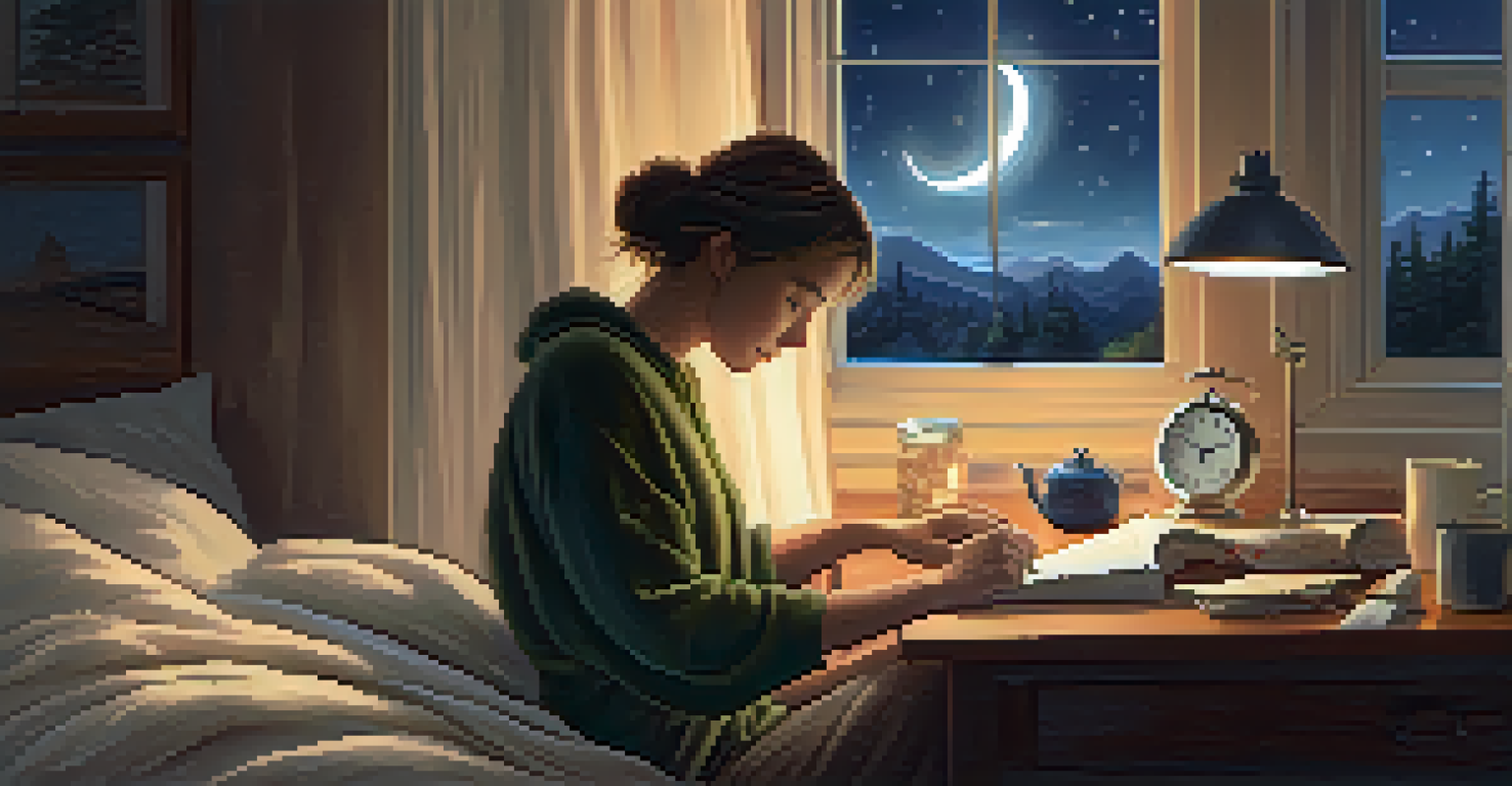The Influence of Social Media on Sleep and Mental Health

Introduction to Social Media's Role in Daily Life
Social media has become an integral part of our daily routines, shaping how we connect and communicate. It's hard to imagine life without scrolling through feeds, sharing photos, or catching up on the latest trends. This constant engagement, while enjoyable, can have unexpected consequences on our sleep and mental health.
Social media is both a blessing and a curse; it can connect us, but also isolate us.
Many people find themselves reaching for their phones first thing in the morning and last thing at night. This habit can lead to a cycle of overuse that affects our overall well-being. With notifications pinging throughout the day, it’s easy to become overwhelmed, making it crucial to understand how this digital presence impacts our rest and mental state.
As we explore this topic, we’ll uncover the multifaceted relationship between social media, sleep patterns, and mental health. By examining both the positive and negative influences, we can better navigate our social media habits.
The Link Between Social Media Use and Sleep Disruption
One of the most significant impacts of social media is its effect on our sleep. Studies have shown that excessive screen time, especially before bed, can lead to difficulties falling asleep. The blue light emitted by screens can interfere with our natural sleep-wake cycle, making it harder for our bodies to wind down.

Scrolling through endless posts can also stimulate our minds, keeping us alert when we should be relaxing. For many, the allure of checking notifications or catching up on news leads to late nights and sleep deprivation. This lack of rest can have a domino effect, resulting in decreased productivity and increased stress during the day.
Social Media Disrupts Sleep Quality
Excessive screen time, particularly before bedtime, can interfere with our natural sleep-wake cycle and lead to sleep deprivation.
Recognizing these patterns is essential for anyone looking to improve their sleep quality. By setting boundaries around social media use in the evenings, we can create a more conducive environment for restful sleep.
Mental Health Impacts of Social Media Engagement
While social media can foster connections, it can also contribute to feelings of anxiety and depression. Users often compare themselves to the curated lives of others, leading to unrealistic expectations and diminished self-esteem. This phenomenon, known as social comparison, can create a vicious cycle of negative feelings.
The best way to predict the future is to create it.
Moreover, the pressure to maintain a certain online persona can lead to stress and burnout. Constantly updating profiles and responding to messages can feel overwhelming, especially for those already struggling with mental health issues. It’s essential to recognize when social media is becoming more of a burden than a blessing.
Encouraging open conversations about mental health on social media platforms can help alleviate these pressures. By sharing authentic experiences, we can foster a more supportive online community.
Finding Balance: Healthy Social Media Habits
To mitigate the negative effects of social media, adopting healthier habits is crucial. Setting specific times for social media use can help create a balance, allowing for connection without detracting from sleep or mental well-being. Many people find success in designating 'phone-free' times, especially during meals and before bed.
Engaging in mindful scrolling—being conscious of the content we consume—can also enhance our social media experience. Following accounts that inspire and uplift can help combat feelings of inadequacy, while unfollowing those that trigger negative emotions can create a more positive online environment.
Mental Health Risks of Comparison
Engaging with social media can foster feelings of anxiety and depression due to unrealistic comparisons with others' curated lives.
Remember, it's about quality over quantity. Fostering genuine connections offline can also provide a much-needed break from the digital world, enhancing both sleep and mental health.
The Role of Sleep Hygiene in Mental Wellness
Sleep hygiene refers to the practices and habits that promote better sleep quality. Establishing a calming bedtime routine, such as reading or meditating, can be beneficial. By prioritizing relaxation before sleep, we signal to our bodies that it’s time to unwind, making it easier to drift off.
Avoiding screens for at least an hour before bed is a key aspect of good sleep hygiene. Instead, consider activities that don’t involve electronics, like journaling or listening to soothing music. This can help create a more restful environment, free from the distractions that social media often brings.
By combining good sleep hygiene practices with mindful social media use, we can significantly improve our mental health and overall well-being.
The Positive Aspects of Social Media on Well-Being
Despite the potential downsides, social media can also have positive effects on mental health. It provides a platform for individuals to share their stories, seek support, and connect with like-minded peers. Many people use these platforms to raise awareness about mental health issues, creating a sense of community and belonging.
Online support groups and mental health resources available through social media can be invaluable. They offer a space for individuals to connect with others facing similar challenges, providing comfort and understanding. This sense of camaraderie can be incredibly uplifting and help combat feelings of isolation.
Balancing Social Media Use
Adopting healthier social media habits, such as mindful scrolling and setting boundaries, can enhance our mental well-being.
Ultimately, it's about harnessing the positive aspects while being mindful of the negatives. By focusing on supportive interactions, we can create an online space that promotes mental wellness.
Conclusion: Navigating Social Media Mindfully
In conclusion, social media is a double-edged sword when it comes to sleep and mental health. While it offers opportunities for connection and support, it can also contribute to sleep disruption and mental strain. Understanding this balance is crucial for maintaining our overall well-being.
By implementing strategies such as setting boundaries around social media use and prioritizing sleep hygiene, we can enjoy the benefits of these platforms without compromising our health. It's all about being intentional with how we engage online.

As we continue to navigate our digital lives, let's strive for a healthier relationship with social media that prioritizes our sleep and mental wellness.